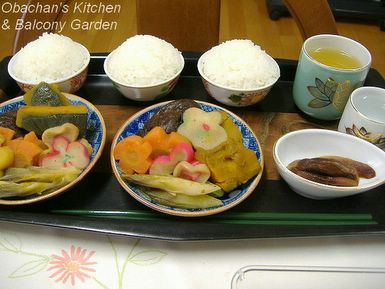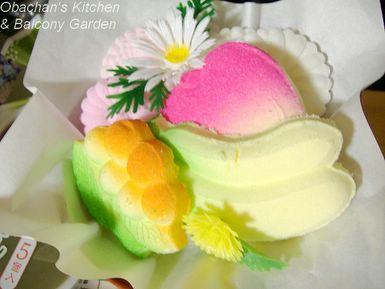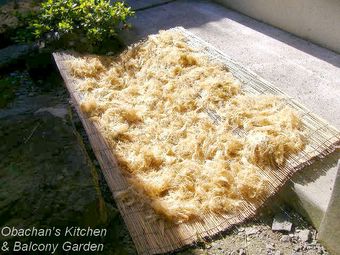I went to my hometown over the long weekend (last Saturday, Sunday and a national holiday on Monday) because it was obon period there, a time for family reunion. Unusual? Yes. I guess the majority of Japanese celebrate this event in mid August. My hometown is one of the exceptional places. Also, there is no such customs as obon-dance or lantern floating in my hometown, so unfortunately I don’t have much to share with you about “typical” Japanese obon customs that you might have heard of.  Oryogo. At my parents’ house, this special meal is offered to ancestors during obon and ohigan (equinoctial weeks in spring and autumn). Since Buddha taught people not to kill animals, traditional ceremony food of this religion is almost always strictly vegan. Mom's oryogo this time consisted of cooked rice, tea, water, simmered foods including Japanese pumpkins, black mushrooms, carrots, myoga ginger, flower-shaped “fu (wheat gluten),” and pickles. In the morning, mom or I bring this meal to the family altar, light incense sticks, ring the bell twice and pray VERY briefly. This meal is supposed to be offered to the ancestors before we eat breakfast, but often things don't go straight and family members have to wait with their breakfast on the table while I struggle to pat the cooked rice into a dorm-shape in those tiny bowls. And as soon as the bell is heard, those at the table start eating breakfast. ;P Later (usually at lunchtime) the meal is taken back from the altar to be shared by the family members. It is said that eating oryogo meal will make you healthy (perhaps because the meal absorbs some magical power from being at the altar for a while???)  This photo shows the regular meal offered to the ancestors at my parents’ house. (See how gorgeous the obon version is compared with this regular meal?) Every time rice is newly cooked, a small amount has to be offered to the ancestors first before we eat it. But our family members are awfully flexible, as you might have already recognized from my previous posts on this blog. Sometimes, when we are extremely busy, we say “Sorry!” to the ancestors in our hearts and eat newly cooked rice without offering any to them. Fortunately, we haven’t heard any complaints so far. ;) This photo shows the regular meal offered to the ancestors at my parents’ house. (See how gorgeous the obon version is compared with this regular meal?) Every time rice is newly cooked, a small amount has to be offered to the ancestors first before we eat it. But our family members are awfully flexible, as you might have already recognized from my previous posts on this blog. Sometimes, when we are extremely busy, we say “Sorry!” to the ancestors in our hearts and eat newly cooked rice without offering any to them. Fortunately, we haven’t heard any complaints so far. ;) Other than the oryogo meal, we (at least in my hometown) offer sweets and fruits to the ancestors during obon period. This colorful sweet called rakugan is a staple of obon. -------- That weekend, mom and I went for shellfish hunting, because we couldn't do that in May. Nothing stopped us this time. :D The weather was nice -- though a little too hot -- and the waves were not rough at all. And see what I got!   That night, I barbecued the abalones with sake, soy sauce and a dash of yuzu vinegar. Sounds good? Well… they were very fresh indeed, but to be honest, they were not as tender as I wanted them to be. I guess I prefer smaller abalones for barbecuing. Mom also picked bunch of tengusa seaweed on the beach AGAIN. In summer, tengusa is washed up on the beach like this with other seaweed, so all you have to do is to selectively pick what you want from the mixture of slimy plants. Well, when mom does something like that, she is driven and nothing can stop her. I had to beg her so many times to go home.    Tengusa on the beach  Tengusa being dried at my parents' house  This is an outdoor sink at my parents' house. Most of the houses in the coastal area have a sink like this in the backyard. It's convenient for gutting big fish or soaking swimming goggles in water or leaving the catches from the ocean while washing feet to go inside the house. Remember, we do not wear shoes in the house in Japan. So if we got our feet wet from catching something in the ocean, we have to wash and dry our feet before getting inside the house in order not to make a mess on tatami mats and wooden floor. The floor has to be kept clean for us to walk on without wearing shoes. This is an outdoor sink at my parents' house. Most of the houses in the coastal area have a sink like this in the backyard. It's convenient for gutting big fish or soaking swimming goggles in water or leaving the catches from the ocean while washing feet to go inside the house. Remember, we do not wear shoes in the house in Japan. So if we got our feet wet from catching something in the ocean, we have to wash and dry our feet before getting inside the house in order not to make a mess on tatami mats and wooden floor. The floor has to be kept clean for us to walk on without wearing shoes.Anyway, the fact I'm trying to ignore is that there is going to be a new addition to mom’s stock of dried tengusa, maybe followed by some more additions before the end of this tengusa season... Ahhhh....! |
Thursday, July 20, 2006
Obon in My Hometown
Posted by
obachan
at
7/20/2006 04:32:00 PM
![]()
Labels: Special occasions
Subscribe to:
Post Comments (Atom)

















14 comments:
Wow.. That is so cool.. catching abalone on the beach like that. I've just came back from one too in Malaysia :) Unfortunately, we've only got dead corals and little silver fishes by the shore...
I truly enjoyed this post!
those tengusa are so colorful! obachan, i think chinese have something similar to obon, called qing ming jie (http://www.c-c-c.org/chineseculture/festival/qingming/qingming.html)
but we've never done it since we're (or were:P) christian.
pinkity
Abalone picking is so much fun, isn't it? It was a lot of work to turn over the rocks in the tidepool, but it was worth it. :)
edmame
Yeah, it does sound similar. And it's so interesting that people fly kites on that day. But don't Chinese people also celebrate urabon-e 盂蘭盆会 (same thing as what I called obon in this post) in summer? I thought that custom came to Japan from India via China.
Hi,
I remembered that you liked zucchini breads. I just baked one following this recipe and I liked it! http://bread.allrecipes.com/az/ZucchiniBreadIV.asp
It's the first time I'm eating zucchini! I'm still waiting for more of your zucchini stories.
Have a good weekend!
hi obachan, there's lots of kite flying, but none as cool as the japanese designs!!
$$$ too, aren't they?
RE: 盂蘭盆会
you're right, holiday esp. for buddhist families. wonder why indian food didn't travel as far as religion back then:P could use some curry. i just remembered, Qing ming jie was officially taught in schools, but they tied it to one of the political fathers in taiwan. not so for 盂蘭盆会!
will you blog different foods for 盂蘭盆会? can't wait.
wow. our local japanese community here in california just celebrated obon a couple of weeks ago. they had the dancing and set another record, more than 1000 dancers on the street. it was trully awesome. and the food was great, but not as traditional as yours of course :)
tabehodai
Oh, yeah, it’s zucchini bread season now. Thanks for reminding me.
I’m glad to hear that you liked your first zucchini bread. Hope you had a nice weekend like I did.
edmame
Well, I guess Indian food didn’t accompany the religion back then because we couldn’t grow Indian spices here in Japan.
Different foods for盂蘭盆会? Well, 盂蘭盆会is already over in my hometown for this year, and I don’t have the nerve to visit other people’s houses in August to blog about their 盂蘭盆会 foods, so I don’t think I can post about it. Sorry.
cathy
Oh, it must have been great to see that many obon dancers on the street! :D I’m really curious what kind of food they have for obon over there.
こんにちは!
テングサから、寒天つくるんでしょうか、、、ご自宅で?!いいなー。
下段のクラフティ、すごく美味しそうです!
こんにちは!
そうです。自宅でトコロテンとかヨウカンとか作っちゃうんですよ。すごく美味しいかどうかは、まあちょっと言葉を濁したいところですが・・・。
このクラフティはとっても気に入ったので、また作ろうと思ってます。
Judging from the size of the drying mat you show, your mother must be very persistant.
I collect rockweed and seawater for steaming shellfish but I have yet to try collecting other seaweed from around here and trying to cook it up. It's just not done and even though I have the books to identify them my family would probably have a fit. I think I would have to cover up by saying I bought it from the oriental market.
Hi nokomarie,
Yeah, she is pretty persistent. :D
I can imagine how your family could react if you would start collecting seaweed and cooking it in the kitchen. Let me tell you, the smell is so....
Anyway, for those who do not have the culture of cooking up seaweed to get agar solution, it would be a lot easier and safer to buy kanten at the oriental market (unless you really want to be a pioneer... ;))
The picture of the pretty fish cakes reminds me of an easy recipe for homemade fish cakes. Store bought is getting more and more flavorless. I think the real thing would be quite an indulgence. A commercial maker told us once that it was basically just real white fish mashed into a paste with a binding ingredient like egg or corn starch (add seasoning if you wish) and then deep fried. *but to be honest, his brand of fishballs are now flavorless although still straightforward tasting.) Maybe you know of another recipe? Will you try to make fish cakes if you like to eat them? I think your homemade would be much better than store bought.
The fishcake looking vegan flowers, I mean. Anyway, I'm thinking about fishcakes. I forgot: that one must use alchohol like sherry in the fishpaste.
anonymous commenter
When you said fish cakes, I wasn’t sure why it was related to this post … Sorry, I don’t have any fish cake recipe, but yeah, I agree. Home-made ones must be better (and contain no chemical additives.)
Post a Comment